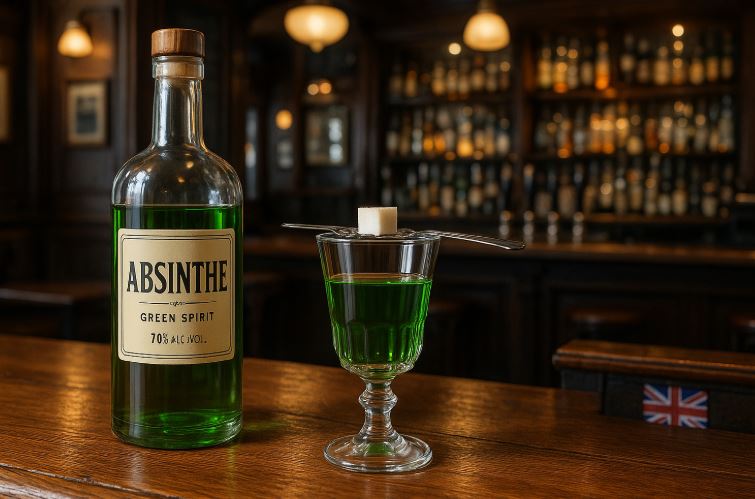Absinthe, often called the Green Fairy, has long intrigued curious drinkers and spirit connoisseurs alike. Its vivid green hue, historical connections to artists and bohemians, and the swirling myths of hallucinations and madness have painted it as both mystical and menacing.
For many in the UK, absinthe carries an air of mystery, primarily because of widespread misconceptions about its legal status.
Growing up or travelling abroad, many people heard whispers that absinthe was banned or dangerous, its name uttered with caution. Some recall scenes from films or literature, where a character sips absinthe and spirals into madness or artistic frenzy. These narratives have blurred the lines between myth and fact.
But here in the UK in 2025, the landscape around absinthe is quite different. In reality, not only is absinthe entirely legal, but it also enjoys a growing popularity among cocktail enthusiasts, spirit collectors, and those curious to rediscover what’s been misunderstood for over a century.
This blog explores the truth behind absinthe’s legality in the UK, its ingredients, its global history of prohibition, and the role it now plays in Britain’s modern drinks culture.
What is Absinthe?
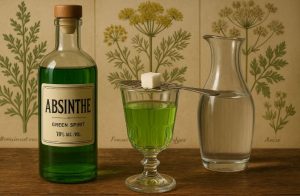
Absinthe is a high-proof spirit traditionally made from green anise, fennel, and wormwood, among other botanicals. It originated in Switzerland in the late 18th century and became particularly popular in France during the 19th and early 20th centuries.
Its striking green colour and reputation for strong effects earned it the nickname “La Fée Verte”, or the Green Fairy.
The Mystique of Absinthe
Part of absinthe’s allure comes from its association with famous cultural figures such as Vincent van Gogh, Oscar Wilde, and Ernest Hemingway. It was believed to inspire creativity and artistic expression, making it a favourite in bohemian circles.
Traditional Production
Absinthe is distilled with botanicals that provide both its unique flavour and iconic colour. A key ingredient is Artemisia absinthium, commonly known as wormwood. This herb contains a compound called thujone, which historically was blamed for the spirit’s alleged psychoactive effects.
Why Was Absinthe Banned in Other Countries?
Despite its popularity, absinthe became the centre of controversy in the early 1900s. Several countries banned it, largely due to misconceptions and social pressures of the time.
Health Concerns and Misunderstandings
The compound thujone was believed to cause hallucinations, convulsions, and other health problems. Absinthe was accused of driving people to madness and violence, often based on sensationalised media stories and poorly conducted scientific studies.
Temperance Movements and Politics
As part of the broader temperance movement sweeping through Europe and America, absinthe became an easy scapegoat. In France, the wine industry, suffering from its own economic troubles, pushed for absinthe to be banned, blaming it for alcoholism and moral decay.
Countries That Imposed Bans
- France banned absinthe in 1915
- The United States followed in 1912
- Switzerland, the spirit’s birthplace, outlawed it in 1910
Despite these bans, some countries like the UK never prohibited absinthe.
Is Absinthe Legal in the UK?
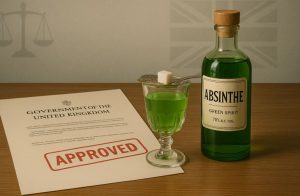
Yes, absinthe is completely legal in the United Kingdom. It has never been restricted or banned, and there are no legal prohibitions on its production, sale, possession, or consumption.
Legal Status in 2025
As of 2025, absinthe is treated just like any other high-proof spirit in the UK. It falls under standard alcohol regulations, with no special restrictions on thujone content as long as it remains within EU safety guidelines, which are still followed post-Brexit.
Why the Confusion?
Much of the confusion stems from its bans in other countries and its infamous reputation in pop culture. Many people assume it is banned everywhere due to media portrayals, but the UK has always permitted it.
What Ingredients Make Absinthe So Controversial?
The controversy around absinthe largely centres on one ingredient: wormwood. More specifically, the thujone found in wormwood raised concerns about its safety.
Key Components of Absinthe
- Wormwood (Artemisia absinthium)
- Green anise
- Fennel
- Hyssop
- Melissa (lemon balm)
These herbs are macerated and then distilled to create the base spirit. Some variations use a secondary maceration to intensify the green colour and flavour profile.
The Role of Thujone
Thujone was blamed for many of the absinthe’s alleged effects, including hallucinations and convulsions. However, modern science has shown that thujone levels in properly distilled absinthe are far too low to cause such symptoms.
How Much Thujone is in UK-Sold Absinthe?
Thujone content in absinthe sold in the UK is strictly regulated. Most modern absinthes contain less than 10 milligrams per kilogram of thujone, far below the threshold required to produce any psychoactive effects.
Thujone Regulations in 2025
The UK aligns with EU standards, which permit up to 35 mg/kg of thujone in bitters and 10 mg/kg in other alcoholic beverages. This ensures absinthe is both safe and legal to consume.
Misunderstandings Around Thujone
Earlier studies that caused panic were often flawed or misinterpreted. Modern testing and regulation have clarified that thujone, in the quantities found in absinthe, poses no significant health risks when consumed responsibly.
Can You Buy Absinthe in the UK Today?
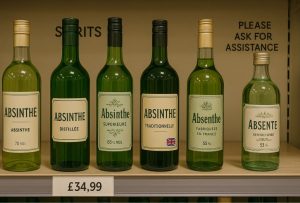
Absolutely. Absinthe is widely available in the UK through both online and physical retailers. From niche spirit shops to major online stores, there are a variety of absinthe brands available for enthusiasts and the curious alike.
Where to Buy Absinthe in the UK?
- Specialist liquor shops like Beers of Europe
- Online cocktail retailers such as Edmunds Cocktails
- Boutique spirit stores and artisan distilleries
You can also find absinthe in select bars across London and other major UK cities, often served in classic styles with sugar cubes and cold water.
What Are the Strongest Absinthe Brands Available in the UK?
Some absinthe brands have a notably high alcohol content, typically ranging between 55% and 75% ABV. While potency doesn’t necessarily equate to quality, it does influence the drinking experience.
Popular High-Proof Absinthe Brands in the UK
- La Fée Parisienne: 68% ABV
- Absente: 69% ABV
- St. George Absinthe Verte: 60% ABV
- Lucid Absinthe: 62% ABV
- Pernod Absinthe: 68% ABV
How to Consume Strong Absinthe?
It is traditionally served diluted with cold water poured over a sugar cube. This method, known as the “louche,” creates a cloudy effect and unlocks the herbaceous aromas of the spirit.
Why Do People Think Absinthe is Still Illegal?
The belief that absinthe is illegal persists due to its history and portrayal in media. Films, novels, and documentaries often dramatise absinthe’s supposed hallucinogenic effects, reinforcing outdated myths.
Factors Fueling the Misconception
- Its ban in countries like France and the US in the past
- Pop culture depictions of madness and hallucinations
- Lack of public knowledge about the science behind thujone
- Rumours on forums and social media
In truth, absinthe is no more dangerous than other strong spirits, provided it is consumed in moderation.
How is Absinthe Regulated Under UK Alcohol Laws?
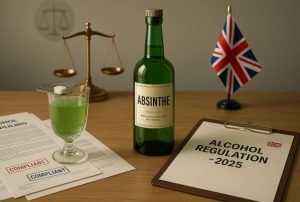
Absinthe is governed by the same rules that apply to all spirits in the UK. This includes licensing for sale, age restrictions for buyers, and regulations on import and production.
Regulatory Framework
- Must adhere to alcohol content and labelling standards
- Sale restricted to individuals aged 18 or older
- Safety compliance on thujone levels and herbal content
- Advertising must follow the guidelines outlined by the ASA
UK-produced absinthe must also meet quality control standards if sold commercially. Consumers are advised to purchase only from reputable sources.
Should You Drink Absinthe Responsibly?
Yes. Absinthe, like all high-strength spirits, should be consumed in moderation. Despite its reputation, the real risk lies in its high alcohol content rather than its ingredients.
Tips for Responsible Absinthe Consumption
- Dilute before drinking, ideally using the traditional method
- Start with small quantities, especially if it’s your first time
- Avoid mixing with other high-proof spirits
- Never drink absinthe in excess, thinking it will cause hallucinations
Absinthe’s power lies not in its mythical effects, but in its strong, refined flavour and rich cultural heritage.
Conclusion
Absinthe is not only legal in the UK in 2025, but it also enjoys a place of growing prestige among spirit lovers. While myths persist about its dangers and illegality, modern science and responsible regulation have cleared its name.
Whether you’re a curious newcomer or a seasoned drinker, absinthe offers a unique and historical experience that is both fascinating and completely lawful.
From its herbal complexity to its misunderstood legacy, absinthe continues to captivate the imagination. The Green Fairy has made a comeback, and in Britain, she was never truly gone.
FAQs
What’s the minimum legal age to buy absinthe in the UK?
In the UK, individuals must be at least 18 years old to purchase any alcoholic beverage, including absinthe.
Does absinthe cause hallucinations?
No, modern absinthe contains too little thujone to cause hallucinations. This belief was based on outdated and flawed studies.
Can absinthe be made at home in the UK?
Yes, but home distillation of spirits is illegal without a proper licence. However, home infusions using store-bought alcohol are allowed.
Is it safe to drink absinthe regularly?
Absinthe is safe in moderation, like any strong spirit. Excessive consumption is harmful due to its high alcohol content.
Why is absinthe so strong compared to other liquors?
Absinthe has a high alcohol concentration to preserve its herbal oils and flavour. It’s typically diluted before drinking.
What is the traditional way to drink absinthe?
Traditionally, absinthe is diluted with cold water poured over a sugar cube placed on a slotted spoon, creating a cloudy louche effect.
Are there UK-based distilleries making absinthe?
Yes, a few artisan distilleries in the UK produce absinthe using traditional methods and legally compliant recipes.





